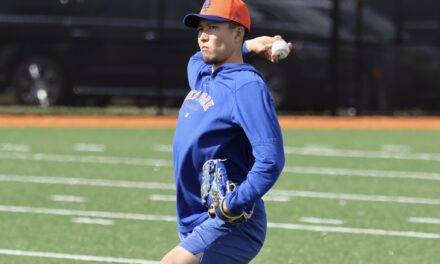
Kodai Senga. Photo by Ed Delaney, MMO
It’s been a while since the Mets were a fundamentally sound baseball team. In the first month of the season, the Mets’ defense was impeccable, and the starting rotation allowed only one unearned run. Flash forward to June, and the staff has now conceded 12 unearned runs this month alone – including the unearned run from Friday night’s game which put a damper on Kodai Senga‘s outing.
Senga found himself in trouble immediately – Brandon Nimmo let Kyle Schwarber‘s shallow fly ball tip off his glove for an error. After a walk and wild pitch, Senga struck out Nick Castellanos on a forkball, but Bryce Harper dropped a single into left field to bring home Schwarber. Senga walked J.T. Realmuto before Bryson Stott‘s sacrifice fly brought home the second run of the inning – which should have been the third out of the inning.
“Last year, we played really sound baseball,” Nimmo said postgame. It’s not like we’re doing things different this year. I’m not really sure what to attribute it to.”
"Last year, we played really sound baseball. I don't know. It's not like we're doing things different this year. I'm not really sure what to attribute it to."
– Brandon Nimmo pic.twitter.com/ILKW56xgCy
— SNY (@SNYtv) June 24, 2023
After the first inning, Senga settled down. He cruised through the second inning, striking out Kyle Schwarber on a fastball. Senga worked around a two-out walk to Harper in the third, getting Turner to whiff over a forkball for his third punch-out. The right-hander gave up a two-out double to Brandon Marsh in the fourth inning but again escaped without damage. Senga dodged a two-out base runner again in the fifth inning, ringing up Schwarber and Harper in the process.
After striking out Realmuto, Senga ran into trouble in the sixth inning. He allowed back-to-back singles to Stott and Alec Bohm to put runners on the corners, prompting Buck Showalter to go to the bullpen. Both inherited runners ended up scoring, once again due to a gaffe by the Mets’ defense. Brandon Marsh hit a pop-up to shallow left field, which Francisco Lindor appeared to be camped under, but the ball fell between him and Tommy Pham, allowing Stott to score.
“That was on me, I usually tell my outfielders, ‘I’m going all the way until I hear you, call me off'”, Lindor said after the game. “I went back and he (Pham) never said anything, I hear the crowd getting louder and louder and louder and I’m assuming he was getting closer, and it’s on me, I should’ve taken full charge of the ball, it’s a pop-up I’ve made many times.”
Josh Walker walked Schwarber with two outs, and Jeff Brigham allowed a two-run single to Turner, delivering the final blow to Senga’s line.
“Everybody is trying to make the perfect play, be everything to everybody every night,” Showalter said in his postgame interview. “The want is through the rook – sometimes through that, you push for some things that aren’t there.”
Defense aside, there were encouraging signs from Senga’s start. He limited hard contact, allowing an average exit velocity of just 82.1 miles per hour. While Senga generated just four whiffs on his fastballs, he registered five whiffs on eight swings on his forkball. Four of his six strikeouts were on the ghost fork, while the other two were on his four-seamer. Senga’s fastball velocity was down slightly, averaging 95.6 MPH compared to his season average of 95.9.
“In this league, the team that makes the least number of mistakes wins,” Senga said through his interpreter after the game. “Each one of us needs to reflect back on the type of mistakes we made and make sure it doesn’t happen again.”
After this start, Senga’s lowered his ERA to 3.52 on the season. The MLB Rookie leads all Mets’ starters with a 118 ERA+ and 11 SO/9. Senga’s next start is lined up for Wednesday night against the Brewers.
















